The legend of the Eight Immortals is one of the most cherished tales of Chinese mythology, symbolizing harmony, righteousness, and the transcendence of human limitations. Each of these divine figures is said to have mastered a unique path to immortality, representing the triumph of different virtues and skills. The story not only reflects the mystical traditions of Taoism but also serves as an inspiring narrative of perseverance, wisdom, and the interplay between the human and the divine. In this version, we will explore the journey of each Immortal, their significance, and how their paths converged to form one of the most renowned groups of legendary beings in Chinese folklore. Long ago, in a time where myths intertwined with reality, the world was said to be a place filled with mystical energies, deities, and those who sought to attain the highest form of existence—immortality. The Eight Immortals were not born gods but were mortals who, through trials and tribulations, mastered the sacred Taoist arts and were bestowed with immortality. The first among them was Zhongli Quan, who was once a general of a great army. During a fierce battle, he was injured and left behind. Despairing of life, he retreated to a mountain where he meditated, fasting for days and seeking enlightenment. One day, a vision came to him, teaching him the secrets of immortality and the art of alchemy. Through his devotion, Zhongli Quan transformed into an immortal, known for his mastery over the elements and the ability to turn stone into gold. His companion, Lu Dongbin, was a scholar of great renown. Despite his intelligence, he sought a deeper understanding of life beyond academia. He encountered Zhongli Quan while traveling, and after a series of dreams that revealed the fleeting nature of earthly pleasures, Lu Dongbin accepted the teachings of Zhongli Quan. He became adept at swordsmanship and developed the ability to fly on the wind, eventually joining the ranks of the immortals. Unlike the others, Cao Guojiu came from a royal family. He was the younger brother of the empress, and his life was filled with luxury and power. But despite his riches, Cao Guojiu was troubled by the corruption of his family, particularly his brother, who used his position to oppress the people. Filled with guilt, Cao Guojiu retreated to a monastery where he sought redemption through meditation and charity. His sincerity impressed the immortals, and they taught him the secret arts. Cao Guojiu, armed with a pair of jade tablets that symbolized his authority, became one of the Eight Immortals. Though each Immortal had their own unique journey, it was through their unity that they truly became legendary. The Eight Immortals often traveled together, sharing their wisdom with those they deemed worthy and protecting the balance between the realms of mortals and deities. They were called upon by the Jade Emperor to intervene in both celestial and earthly matters, ensuring that the balance of yin and yang was maintained. One of the most famous stories of the Eight Immortals involves their crossing of the Eastern Sea. It was said that each Immortal, equipped with their magical item, used their own unique methods to cross the waters without a boat. Zhongli Quan used his powerful fan to create a wind that carried him across, while Lu Dongbin soared effortlessly through the air on his magical sword. He Xiangu floated delicately on a lotus flower, and Cao Guojiu used his imperial tablets to part the sea. Han Xiangzi’s flute summoned a giant fish to carry him across, and Zhang Guolao, as always, rode his reverse white donkey, which could fly over water. Lan Caihe drifted on a leaf, carried by the winds, completing the group’s crossing. Their voyage across the Eastern Sea wasn’t merely a test of their power, but a symbol of their unity. Despite their different backgrounds, they all embodied the principles of Taoism and worked together to achieve harmony. One of the greatest challenges the Eight Immortals faced was their battle with the Demon King, an evil entity who sought to disrupt the balance of the world. The Demon King, angered by the immortals’ interference in his plans, decided to invade the celestial realms and overthrow the gods. The Eight Immortals, each with their own strengths, fought valiantly against the Demon King’s forces. Zhongli Quan, with his control over the elements, summoned fierce winds and storms to push back the demon hordes. Lu Dongbin, wielding his sword, cut through the darkness with swift strikes, protecting his fellow immortals from the Demon King’s attacks. He Xiangu used her healing abilities to keep the Immortals strong, while Cao Guojiu’s authority granted them protection from the Demon King’s corrupting magic. Han Xiangzi’s flute played a melody so pure that it weakened the dark powers of their enemies, and Zhang Guolao’s strange tricks confused and disoriented the Demon King’s forces. Even Lan Caihe, often the most carefree, fought bravely, using their knowledge of the transient nature of life to outwit the demons. At the height of the battle, the Demon King unleashed his full power, threatening to engulf the world in chaos. It was then that the Jade Emperor himself appeared, lending his divine aid to the Eight Immortals. With their combined might, they banished the Demon King to the underworld, restoring peace to both the mortal and celestial realms. The tale of the Eight Immortals is one that continues to inspire generations. Their stories are not only a reflection of Taoist philosophy but also a reminder of the virtues of compassion, wisdom, and unity. Each of the Eight Immortals represents a different path to enlightenment, showing that there is no single way to achieve greatness or immortality. Through their trials, they have become symbols of hope, guiding those who seek balance in life. Today, statues, paintings, and stories of the Eight Immortals can be found across China, reminding people of their legacy. The Eight Immortals remain a central figure in Chinese mythology, embodying the eternal struggle between good and evil, light and darkness, and the balance that lies at the heart of the universe. Their immortality is not just a gift but a responsibility. They continue to watch over the world, ensuring that harmony is maintained, and teaching that through perseverance, wisdom, and unity, even mortals can transcend their limitations. The Eight Immortals serve as a powerful reminder that the journey to immortality is not only one of spiritual enlightenment but also a path that requires the virtues of bravery, kindness, and wisdom. Their individual stories of struggle and triumph reflect the values of Taoism and Chinese culture, where harmony, balance, and the interconnectedness of all things are paramount.The Origins of the Eight Immortals
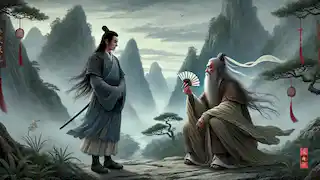
He Xiangu's Path to Enlightenment
He Xiangu was a young maiden from a humble village, known for her beauty and kindness. Her heart, however, was set on seeking a spiritual path rather than earthly pleasures. One night, a vision of a celestial being came to her in a dream, telling her to consume powdered mica, a mystical mineral, to purify her body and soul. Following the vision's advice, she began the practice and eventually transcended her mortal body. He Xiangu became an immortal known for her healing powers and her ability to nourish the sick with sacred herbs.
The Wanderers and Their Journey
Han Xiangzi, a carefree musician, discovered his path to immortality through his love of music. A student of Lu Dongbin, Han Xiangzi played melodies so divine that even the spirits were moved. It is said that through his music, he could summon rain and flowers, harmonizing the elements with the vibrations of his flute. His carefree nature allowed him to embrace the Taoist teachings of spontaneity and non-attachment, leading him to immortality.
Zhang Guolao, on the other hand, was a hermit and an eccentric known for riding his white donkey backward. He was a master of divination and alchemy, often using his strange appearance to trick and test others. It is believed that Zhang Guolao’s mastery of life and death allowed him to reanimate his body at will, a skill that made him a revered figure among the immortals. His unique wisdom, though sometimes difficult to understand, played a crucial role in the group’s adventures.
Lan Caihe, another figure among the Eight Immortals, was a mysterious character whose age and gender have remained ambiguous throughout time. Lan Caihe wandered the streets singing celestial songs and distributing wealth to the poor. With a basket of flowers symbolizing impermanence, they often acted as a reminder of the fleeting nature of material possessions. Despite their unconventional lifestyle, Lan Caihe’s connection to the divine allowed them to ascend to immortality.
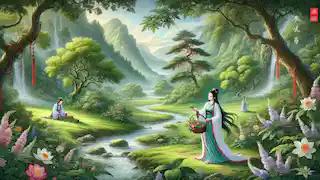
Unity of the Immortals
The Battle with the Demon King
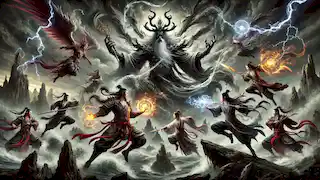
The Legacy of the Eight Immortals
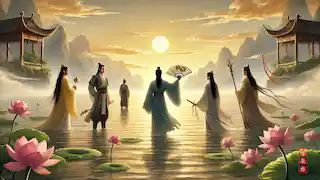
Conclusion
The Story of the Eight Immortals
Reading Time: 8 min
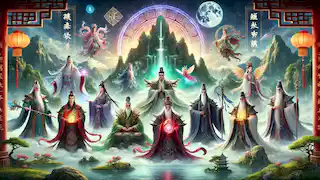
About Story: The Story of the Eight Immortals is a Myth Stories from china set in the Ancient Stories. This Descriptive Stories tale explores themes of Perseverance Stories and is suitable for All Ages Stories. It offers Cultural Stories insights. The legendary journey of eight mortals who achieve immortality through virtue and wisdom.


















